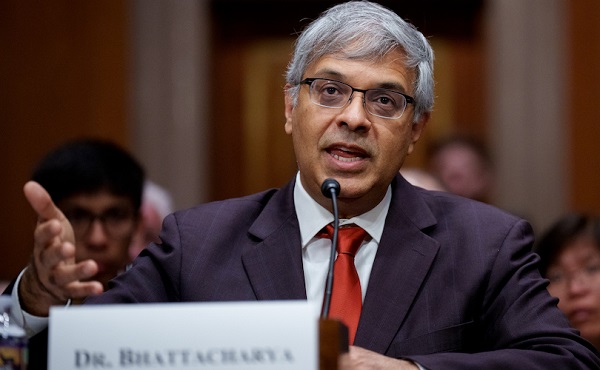Health
Ethical Vaccine: Trump nominee Jay Bhattacharya says NIH will not use aborted babies in research

Jayanta Bhattacharya, U.S. President Donald Trump’s nominee to be Director of the National Institutes of Health, speaks at his confirmation hearing before the Senate Committee on Health, Education, Labor, and Pensions on Capitol Hill
From LifeSiteNews
By Matt Lamb
The use of aborted babies in research is one of the main reasons many Christians oppose the use of several vaccines
The National Institutes of Health will not use abortion fetal tissue in research, according to President Donald Trump’s nominee to lead the agency.
Dr. Jay Bhattacharya made the comments on Wednesday during his hearing in front of the Senate Health, Education, Labor, and Pensions Committee in response to a question from Republican Senator Josh Hawley of Missouri.
“In public health, we need to make sure the products of science are ethically acceptable to everybody,” Bhattacharya said during the hearing. “And so having alternatives that are not ethically conflicted with fetal cell lines is not just an ethical issue, but it’s a public health issue.”
Dr. Bhattacharya said it is important to have ethical testing guidelines, sharing his experience answering questions on Catholic radio about the mRNA COVID shots. The jabs are tainted by their development using a fetal cell line derived from an aborted baby, which has caused moral concerns for faithful Catholics and also Protestants.
“Looking forward to voting for him to be our next NIH director,” Sen. Hawley wrote on X (formerly Twitter).
Dr. Bhattacharya is a well-respected medical doctor who gained further fame as a COVID contrarian, rejecting the establishment narrative that widespread lockdowns of the economy and schools were needed to slow the spread of the virus.
As LifeSiteNews previously reported:
Bhattacharya was one of the earliest and most notable critics of the draconian COVID response by most governments around the world. In October 2020 he co-authored The Great Barrington Declaration, which criticized the harmful lockdown policies. Bhattacharya is a professor of medicine, economics, and health research policy at Stanford University in California and the director of Stanford’s Center for Demography and Economics of Health and Aging.
Bhattacharya is the latest high-ranking public health official to affirm the Trump administration will not allow for the use of aborted fetal tissue in federally funded research.
Secretary of Health and Human Services Robert F. Kennedy Jr. previously assured Sen. Hawley he would prohibit the practice when questioned prior to his confirmation.
“Will you reinstate President Trump’s policy that ensures that no federal research and no federal tax dollars is conducted on fetal tissue taken from elective abortions,” Hawley asked RFK Jr.
“Yes,” the nominee said, as previously reported by LifeSiteNews.
President Trump’s administration previously rejected 13 or 14 requests to use aborted fetal tissue, as LifeSiteNews reported in 2020.
Health
MAiD should not be a response to depression

This article supplied by Troy Media.
Canadians need real mental health support, not state-sanctioned suicide
If the law Parliament plans to roll out in 2027 had been on the books 15 years ago, Member of Parliament Andrew Lawton says he’d probably be dead. He’s not exaggerating. He’s referring to Canada’s scheduled expansion of medical assistance in dying (MAiD) to include people suffering only from mental illness.
Lawton, who survived a suicide attempt during a period of deep depression, knows what’s at stake. So do others who’ve shared similar stories. What they needed back then wasn’t a government-approved exit plan. They needed care, time, and something MAiD quietly discards: the possibility of recovery.
MAiD, medical assistance in dying, was legalized in Canada in 2016 for people with grievous and irremediable physical conditions. The 2027 expansion would, for the first time, allow people to request MAiD solely on the basis of a mental illness, even if they have no physical illness or terminal condition.
With the expansion now delayed to March 2027, Parliament will once again have to decide whether it wants to cross this particular moral threshold. Although the legislation was passed in 2021, it has never come into force. First pushed back to 2024, then to 2027, it remains stalled, not because of foot-dragging, but due to intense medical, ethical and public concern.
Parliament should scrap the expansion altogether.
A 2023 repeal attempt came surprisingly close—just 17 votes short, at 167 to 150. That’s despite unanimous support from Conservative, NDP and Green MPs. You read that right: all three parties, often at each other’s throats, agreed that death should not be an option handed out for depression.
Their concern wasn’t just ethical, it was practical. The core issues remain unresolved. There’s no consensus on whether mental illness is ever truly irremediable—whether it can be cured, improved or even reliably assessed as hopeless. Ask 10 psychiatrists and you’ll get 12 opinions. Recovery isn’t rare. But authorizing MAiD sends the opposite message: that some people’s pain is permanent, and the only answer is to make it stop—permanently.
Meanwhile, access to real mental health care is sorely lacking. A 2023 Angus Reid Institute poll found 40 per cent of Canadians who needed treatment faced barriers getting it. Half of Canadians said they outright oppose the expansion. Another 21 per cent weren’t sure—perhaps assuming Canada wouldn’t actually go through with something so dystopian. But 82 per cent agreed on one thing: don’t even think about expanding MAiD before fixing the mental health system.
That disconnect between what people need and what they’re being offered leads to a more profound contradiction. Canada spends millions promoting suicide prevention. There are hotlines, campaigns and mental health initiatives. Offering MAiD to people in crisis sends a radically different message: suicide prevention ends where bureaucracy begins.
Even Quebec, normally Canada’s most enthusiastic adopter of progressive policy experiments, has drawn the line. The province has said mental disorders don’t qualify for MAiD, period. Most provincial premiers and health ministers have called for an indefinite delay.
Internationally, the United Nations Committee on the Rights of Persons with Disabilities has condemned Canada’s approach and urged the government not to proceed. Taken together, the message is clear: both at home and abroad, there’s serious alarm over where this policy leads.
With mounting opposition and the deadline for implementation approaching in 2027, Parliament will again revisit the issue this fall.
A private member’s bill from MP Tamara Jansen, Bill C-218, which seeks to repeal the 2027 expansion clause, will bring the issue back to the floor for debate.
Her speech introducing the bill asked MPs to imagine someone’s child, broken by job loss or heartbreak, reaching a dark place. “Imagine they feel a loss so deep they are convinced the world would be better off without them,” she said. “Our society could end a person’s life solely for a mental health challenge.”
That isn’t compassion. That’s surrender.
Expanding MAiD to mental illness risks turning a temporary crisis into a permanent decision. It treats pain as untreatable, despair as destiny, and bureaucracy as wisdom. It signals to the vulnerable that Canada is no longer offering help—just a final form to sign.
Parliament still has time to reverse course. It should reject the expansion, reinvest in suicide prevention and reassert that mental suffering deserves treatment—not a state-sanctioned exit.
Daniel Zekveld is a Policy Analyst with the Association for Reformed Political Action (ARPA) Canada.
Explore more on Euthanasia, Assisted suicide, Mental health, Human Rights, Ethics
Troy Media empowers Canadian community news outlets by providing independent, insightful analysis and commentary. Our mission is to support local media in helping Canadians stay informed and engaged by delivering reliable content that strengthens community connections and deepens understanding across the country.
Health
Nearly 200,000 Albertans left an emergency room without treatment last year, finds the MEI

Across Canada, over 1.2 million patients left emergency rooms untreated last year.
The number of patients leaving Alberta’s emergency rooms without being treated is rising, reveals a report published this morning by the MEI.
“These patients are not leaving because they feel better, but because the system is failing them,” says Emmanuelle B. Faubert, economist at the MEI and author of the report. “Thousands of Albertans are being denied access to care each year.”
In 2024, Alberta recorded nearly 2.3 million emergency room visits. Of these, 199,615 ended with a patient leaving before receiving treatment, representing 8.8 per cent of all visits.
This marks a worsening trend, with the ratio of patients leaving surging by 76.5 per cent since 2019. Patients in Alberta walk away from emergency rooms without receiving care at a rate that is higher than the national average of 7.8 per cent.
Across Canada, 16.3 million emergency room visits were made last year, and 1,267,736 patients were left untreated—around one in every thirteen visits. This data doesn’t include patients living in Saskatchewan, or those covered by New Brunswick’s Vitalité Santé health network, those health authorities having both failed to provide the requested 2024 data in time for publication.
The deterioration is observed nationwide, as rates of premature departures have risen significantly since 2019. Last year, the number of Canadian patients leaving without treatment increased by 35.6 per cent.
In Alberta, nearly half of those who leave without treatment are classified as P3, which are cases that are not life-threatening but still require urgent medical attention.
“This is particularly troubling as it means patients are sent back to the waiting room despite a very real risk of deterioration,” says Ms. Faubert.
The MEI researcher emphasized that patients forced to delay or forgo care often end up suffering from worsening conditions, which lead to more complex cases.
In a U.S. study conducted between 2019 and 2020, researchers found that 55 per cent of patients who left an emergency room before being treated ended up consulting a healthcare professional within three weeks of their initial visit.
The MEI recommends increasing access to upstream care, which includes:
Increasing the use of specialized nurse practitioner clinics;
Granting the broadest scope of practice to pharmacists; and
Allowing for the creation of non-governmental Immediate Care Medical Centres, based on the French model, to treat non-life-threatening emergencies.
“Solving the crisis in primary care is essential if we want to keep patients from continuing to fall through the cracks,” says Ms. Faubert. “Policymakers must find the political courage to open up healthcare delivery to independent and alternative providers, or else this crisis is bound to get worse.”
The MEI Economic Note is available here: https://www.iedm.org/wpcontent/uploads/2025/09/economic-note-102025.pdf
* * *
The MEI is an independent public policy think tank with offices in Montreal, Ottawa, and Calgary. Through its publications, media appearances, and advisory services to policymakers, the MEI stimulates public policy debate and reforms based on sound economics and entrepreneurship.
-

 Alberta2 days ago
Alberta2 days agoAlberta first to add citizenship to licenses
-

 Alberta2 days ago
Alberta2 days agoBreak the Fences, Keep the Frontier
-

 Business1 day ago
Business1 day agoCarney’s ‘major projects’ list no cause for celebration
-

 Business1 day ago
Business1 day agoGlobal elites insisting on digital currency to phase out cash
-

 Business1 day ago
Business1 day agoRed tape is killing Canadian housing affordability
-

 Health23 hours ago
Health23 hours agoMAiD should not be a response to depression
-

 Artificial Intelligence22 hours ago
Artificial Intelligence22 hours agoUK Police Chief Hails Facial Recognition, Outlines Drone and AI Policing Plans
-

 Business20 hours ago
Business20 hours agoOttawa’s so-called ‘Clean Fuel Standards’ cause more harm than good





